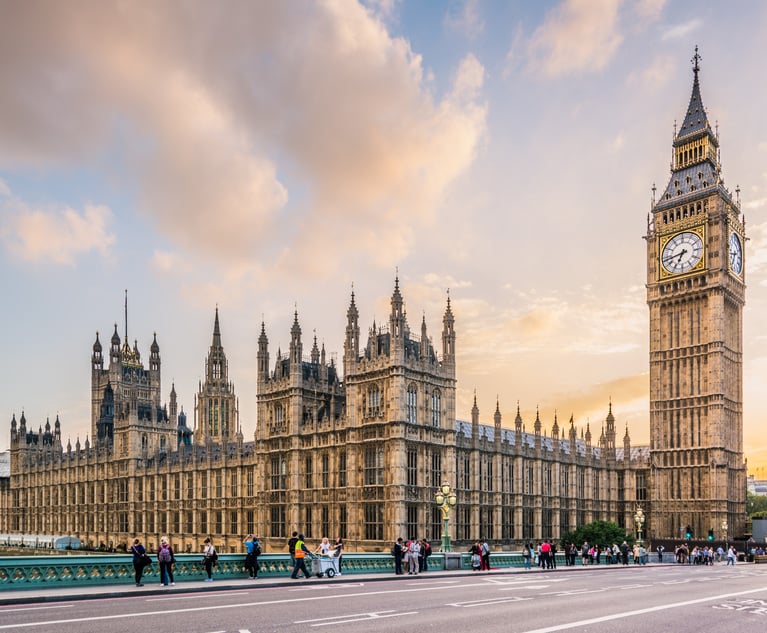Govt confirms plans for plea bargain deals in corporate crime crackdown
The Government is to press ahead with controversial reforms to usher in plea bargaining for corporates in what legal advisers regard as a major step towards US-style white collar crime enforcement in the UK. The Ministry of Justice (MoJ) today (23 October) said that it would legislate to bring in so-called deferred prosecution agreements (DPAs) in the UK in what the ministry dubbed an "important new tool to combat economic crime".
October 23, 2012 at 08:40 AM
4 minute read
The Government is to press ahead with controversial reforms to usher in plea bargaining for corporates in what legal advisers regard as a major step towards US-style white collar crime enforcement in the UK.
The Ministry of Justice (MoJ) today (23 October) said that it would legislate to bring in so-called deferred prosecution agreements (DPAs) in the UK in what the ministry dubbed an "important new tool to combat economic crime".
DPAs are a form of plea-bargaining which enables a prosecutor to defer criminal prosecution against an organisation, in return for compliance with a range of conditions, such as financial heavy penalties, making reparations to victims, undertaking reform and monitoring.
The MoJ said agreements will be made in open court and published, so that the wrongdoing and sanctions imposed are transparent. It stated that DPAs would not be a substitute for prosecution, and that if an organisation failed to meet conditions set in the agreement, it could face prosecution.
DPAs are viewed by many legal advisers as the primary means by which the US achieves its robust levels of enforcement in white collar investigations.
The UK Serious Fraud Office has lobbied strongly for DPAs to be introduced domestically, with the UK Attorney General's Office launching a consultation on such a move last autumn. The MoJ today said that 86% of respondents backed the introduction of DPAs during the consultation.
Kingsley Napley partner Michael Caplan QC welcomed the policy, provided there are "appropriate safeguards and they are properly policed".
"This will require the cooperation of the judiciary, who will be keen to uphold the public interest in prosecuting corporate fraud, ensuring justice is not surrendered in favour of political or financial expediency."
Caplan added that the future "may look bleak" for executives finding themselves exposed to criminal prosecution once a DPA has been made.
However, the move will be criticised by those arguing that companies increasingly face strong-arm tactics thanks to the global regulatory clampdown, effectively forcing many companies convinced of their innocence to accept a plea deal.
Speaking at the Legal Week Corporate Governance and Risk Forum on 18 October, David Bermingham (pictured) – one of the 'NatWest Three' bankers controversially extradited to the US and charged in relation to Enron's collapse – strongly criticised the role of DPAs.
"Plea bargaining is game theory – there's no other way to describe it," he told delegates. "Put two men in a room each with a prosecutor, and say, 'Which ever one of you does the deal first gets the best deal.'
"You have two choices: you can stand by your principles and end up in jail. Or you can do what 98% of people do, which is play the get-out-of jail-early card."
However, Stephenson Harwood partner Tony Woodcock commented: "I believe the move is sensible and mature. It has been tried and tested, usually to good effect, in other jurisdictions. The ultimate objective is to eradicate corruption, and a tool which effects that objective, perhaps more easily and in a more structured way, is to be welcomed."
Announcing the measures, justice minister Damian Green said: "Deferred prosecution agreements will give prosecutors an effective new tool to tackle what has become an increasingly complex issue. It will ensure that more unacceptable corporate behaviour is dealt with including through substantial penalties, proper reparation to victims, and measures to prevent future wrongdoing."
Click here for the consultation document on DPAs.
This content has been archived. It is available through our partners, LexisNexis® and Bloomberg Law.
To view this content, please continue to their sites.
Not a Lexis Subscriber?
Subscribe Now
Not a Bloomberg Law Subscriber?
Subscribe Now
NOT FOR REPRINT
© 2025 ALM Global, LLC, All Rights Reserved. Request academic re-use from www.copyright.com. All other uses, submit a request to [email protected]. For more information visit Asset & Logo Licensing.
You Might Like
View All
Malaysia’s Shearn Delamore Set To Expand Local Footprint With New Office Launch


CMA Uses New Competition Powers to Investigate Google Over Search Advertising

‘A Slave Drivers' Contract’: Evri Legal Director Grilled by MPs
Trending Stories
- 1DOT Nominee Duffy Pledges Safety, Faster Infrastructure Spending in Confirmation Hearing
- 2'Younger and Invigorated Bench': Biden's Legacy in New Jersey Federal Court
- 3'Every Single Judge on Board': First-Impression Case Revived
- 4NYSBA Annual Meeting: How In-House Counsel Navigate Gen AI Risk
- 5A Judge Ordered Squabbling Lawyers to Have Lunch: Here's What Happened
Who Got The Work
J. Brugh Lower of Gibbons has entered an appearance for industrial equipment supplier Devco Corporation in a pending trademark infringement lawsuit. The suit, accusing the defendant of selling knock-off Graco products, was filed Dec. 18 in New Jersey District Court by Rivkin Radler on behalf of Graco Inc. and Graco Minnesota. The case, assigned to U.S. District Judge Zahid N. Quraishi, is 3:24-cv-11294, Graco Inc. et al v. Devco Corporation.
Who Got The Work
Rebecca Maller-Stein and Kent A. Yalowitz of Arnold & Porter Kaye Scholer have entered their appearances for Hanaco Venture Capital and its executives, Lior Prosor and David Frankel, in a pending securities lawsuit. The action, filed on Dec. 24 in New York Southern District Court by Zell, Aron & Co. on behalf of Goldeneye Advisors, accuses the defendants of negligently and fraudulently managing the plaintiff's $1 million investment. The case, assigned to U.S. District Judge Vernon S. Broderick, is 1:24-cv-09918, Goldeneye Advisors, LLC v. Hanaco Venture Capital, Ltd. et al.
Who Got The Work
Attorneys from A&O Shearman has stepped in as defense counsel for Toronto-Dominion Bank and other defendants in a pending securities class action. The suit, filed Dec. 11 in New York Southern District Court by Bleichmar Fonti & Auld, accuses the defendants of concealing the bank's 'pervasive' deficiencies in regards to its compliance with the Bank Secrecy Act and the quality of its anti-money laundering controls. The case, assigned to U.S. District Judge Arun Subramanian, is 1:24-cv-09445, Gonzalez v. The Toronto-Dominion Bank et al.
Who Got The Work
Crown Castle International, a Pennsylvania company providing shared communications infrastructure, has turned to Luke D. Wolf of Gordon Rees Scully Mansukhani to fend off a pending breach-of-contract lawsuit. The court action, filed Nov. 25 in Michigan Eastern District Court by Hooper Hathaway PC on behalf of The Town Residences LLC, accuses Crown Castle of failing to transfer approximately $30,000 in utility payments from T-Mobile in breach of a roof-top lease and assignment agreement. The case, assigned to U.S. District Judge Susan K. Declercq, is 2:24-cv-13131, The Town Residences LLC v. T-Mobile US, Inc. et al.
Who Got The Work
Wilfred P. Coronato and Daniel M. Schwartz of McCarter & English have stepped in as defense counsel to Electrolux Home Products Inc. in a pending product liability lawsuit. The court action, filed Nov. 26 in New York Eastern District Court by Poulos Lopiccolo PC and Nagel Rice LLP on behalf of David Stern, alleges that the defendant's refrigerators’ drawers and shelving repeatedly break and fall apart within months after purchase. The case, assigned to U.S. District Judge Joan M. Azrack, is 2:24-cv-08204, Stern v. Electrolux Home Products, Inc.
Featured Firms
Law Offices of Gary Martin Hays & Associates, P.C.
(470) 294-1674
Law Offices of Mark E. Salomone
(857) 444-6468
Smith & Hassler
(713) 739-1250








